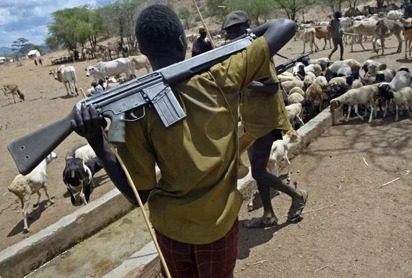National Issues
Nigeria: A Technology Enabled Fulani Herdsman Grazing Route -By Femi Oyesanya
In 1968, the Nigerian Government established the Grazing reserves Act of 1968. The act designated land mass for animal grazing. According to Adeoye “there already exist 4125 grazing reserves in the country, unfortunately, only one-third is utilized, while the remaining 270 have either been built on or converted to farmland, and these has annoyed the herdsmen and may be one of the things fueling the crisis.”

According to an article by the International Crisis Group, an organization that seeks to prevent crisis around the world, the cause of the conflicts between the Fulani Herdsmen and farmers in Nigeria and other West African Countries is not only due to the role a traditional way of life plays against modern development, it is also related to environmental changes. “Drought and desertification have degraded pastures, dried up many natural water sources across Nigeria’s far-northern Sahelian belt and forced large numbers of herders to migrate south in search of grassland and water for their herds.” [1]
According to Statita.com, and online statistics data reporting portal, between 2015 and 2020, Jihadist Fulani Herdsmen have killed a total of 7400 christians[2]. It should be noted that these numbers do not capture the magnitude of the crisis. There are almost daily reports from Nigerian newspapers of Fulani Herdmen killing, looting and raping famers in almost every region of Nigeria and other parts of Africa.

Fulani herdsman and his cows.
What has the Nigerian Government done So far?
In 1968, the Nigerian Government established the Grazing reserves Act of 1968. The act designated land mass for animal grazing. According to Adeoye “there already exist 4125 grazing reserves in the country, unfortunately, only one-third is utilized, while the remaining 270 have either been built on or converted to farmland, and these has annoyed the herdsmen and may be one of the things fueling the crisis.”[3]
So, the 1968 Grazing rights Act was never implemented, even if it was, it is not certain that the conflict would not exist today. This is because in addition to, according to the CrisisGroup, “obstruction of traditional migration routes, livestock theft and crop damage – tend to trigger these disputes. But their roots run deeper. Drought and desertification have degraded pastures, dried up many natural water sources across Nigeria’s far-northern Sahelian belt and forced large numbers of herders to migrate south in search of grassland and water for their herds.” [4]. The traditional free range routes that were there before have mostly disappeared. The Fulani Herdsmen has adapted, the adaptation is a source of conflict.
Another proposal by the Nigerian Government was the Ruga Settlement Plan. The plan sought to build cattle settlement communities across all 36 states of the country, thus isolating Fulani Herdsmen to these communities and containing the spread of conflict. Most southern states rejected the proposal. One argument against the proposal was that cattle farming was private business, and that the government should not subsidise private business on the scale being proposed.
As the traditional grazing routes became unavailable, the crisis migrated to the southern parts of Nigeria. Now, the Governors of 17 Southern States have announced a total ban on open grazing. The Attorney General of Nigeria however has commented that the ban is not constitutional. The crisis has been prolonged mainly due to Fulani Herdsmen failure to adopt modern cattle farming methodologies as modernization and climate change created natural obstructions to the traditional way of life.
How then does Nigeria preserve this traditional way of life, and implement a system where the Fulani Herdsmen and Farmer can coexist peacefully for generations. One solution is more that gives potential economic benefit to farmers, herdsmen, and government. There are existing technologies that can map cattle migration patterns and farming settlements. This proposal attempts to create synergy between Fulani Herdsman, Farmer, and Government.
An Intelligent Open Grazing System Solution
One solution to this crisis might be an Intelligent Grazing System that preserves the Fulani Herdsmen traditional way of life, preserves farmers property from destruction, monitors grazing activities and grazing migration, gives incentives to farmers, and proactively settles farmer-herder conflict. The following are key components of the System
- A) The Government must digitally map the current cattle migration route.
- B) The Government must digitally map all farming areas along the cattle migration route.
- C) Both Federal and State Governments give farmers subsidized incentives to grow cattle feed and watering areas along the cattle migration route.
- D) Fulani Herdsmen that graze in all parts of Nigeria must register and have cattle tagged with GPS devices so that their location is monitored at all times. Registration also allows the Government to tax the Fulani Herdsman.
- E) The Government must implement aerial monitoring technologies along the grazing routes using drone technologies to predict farmer and herdsman activities that can cause potential conflict.
References
- https://www.crisisgroup.org/africa/west-africa/nigeria/252-herders-against-farmers-nigerias-expanding-deadly-conflict
- https://www.statista.com/statistics/1198134/christians-killed-by-terrorist-groups-in-nigeria/
- N.O. Adeoye, “Land use Conflict between Farmers and Herdsmen in parts of Kano, Yobeand Borno States of Nigeria: Nomads View Points”, Ghana Jour of Geo, 2017, vol. 9(1), pp. 124-151
- https://www.crisisgroup.org/africa/west-africa/nigeria/252-herders-against-farmers-nigerias-expanding-deadly-conflict
Femi Oyesanya MA. MIS (CISSP)
Chicago IL
















